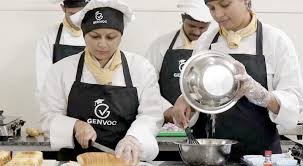1. Associate of Applied Science (AAS) in Culinary Arts
- Duration: Typically 2 years
- Focus: This degree emphasizes practical skills and hands-on experience in the kitchen. It focuses on food preparation, cooking techniques, kitchen management, sanitation, and nutrition.
- Career Path: Graduates often pursue careers as line cooks, sous chefs, pastry chefs, or even assistant kitchen managers. It's a strong foundation for those aiming to work in restaurants, hotels, or catering companies.
2. Associate of Occupational Studies (AOS) in Culinary Arts
- Duration: Similar to the AAS, typically 2 years
- Focus: The AOS also focuses on the practical and technical skills needed for a culinary career but places a greater emphasis on immediate job readiness. It typically includes more hands-on experience with fewer general education requirements compared to an AAS.
- Career Path: This degree is designed for those looking to enter the workforce quickly, often aiming for roles such as chef de partie, line chef, or commis chef.
- Duration: Usually 6 months to 1 year
- Focus: A diploma is a more focused, short-term program compared to a degree. It’s ideal for students who want to enter the industry quickly and may already have some background or experience in food service.
- Career Path: Graduates may begin as prep cooks or junior chefs in restaurants and catering companies. This program is also useful for those who are transitioning into the culinary field or want to sharpen specific skills.
4. Certificate in Culinary Arts
- Duration: Typically a few months to 1 year
- Focus: A certificate is a concentrated program focusing on specific culinary techniques or areas of interest like baking, pastry arts, or basic culinary foundations. These programs are less comprehensive than degrees but provide targeted knowledge.
- Career Path: Graduates often work in entry-level positions such as line cooks or kitchen assistants, or they might specialize in specific areas like pastry or garde manger (cold kitchen).
5. Bachelor of Science (BS) in Culinary Arts
- Duration: 4 years
- Focus: A bachelor's degree offers a more in-depth and comprehensive education. In addition to culinary skills, it includes general education courses (math, writing, history, etc.) and advanced topics like restaurant management, food science, nutrition, business operations, and even marketing. It also emphasizes leadership and managerial skills in the food industry.
- Career Path: Graduates can pursue higher-level positions such as executive chef, food and beverage manager, restaurant owner, or positions in food product development or culinary education.
6. Bachelor's in Hospitality Management with a Culinary Focus
- Duration: 4 years
- Focus: This degree combines culinary skills with hospitality management, focusing on both the food service industry and the management of hotels, resorts, and other establishments. It's more holistic and includes topics like business administration, customer service, and event management.
- Career Path: Graduates may pursue managerial roles in restaurants, resorts, hotels, or catering companies. They might also become food service directors or event planners with a focus on food and dining experiences.
Each of these courses provides different levels of culinary education and training, and the right choice depends on your career goals, the time you want to invest in education, and whether you aim for hands-on kitchen work or management and leadership roles in the culinary world.






Comments